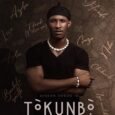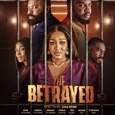Adunni Ade, Lateef Adedimeji, Teniola Aladese, Femi Jacobs, Meg Otanwa, Sola Sobowale, Bukunmi Oluwasina, Saidi Balogun, Eso Dike
A group of travellers on a bus journey home for Christmas find themselves entangled in a cat-and-mouse game with dangerous criminals.
Kayode Kasum
Adunni Ade
Stephen Okonkwo, Lilian Carmen Ike-Okoro, Kayode Kasum
2021
Netflix
Good direction.
Poor comedy, a badly woven plot.
Nothing hurts a comedy more than obvious attempts to elicit laughs that come across as cringy, and Soole is chock full of them. It is probably good news then that Soole is not really a comedy, at least not after its first act; its plot (if you want to call it that) looks sewn together from at least three different separate storylines. It begins like a comedy, one of those that puts multiple individuals from different backgrounds in a single place, here, a luxury bus to the Enugu, and the diverse worlds they come from—there is a pastor, a traditionalist, and a Reverend sister on the bus—should allow for comic and heartfelt moments when they interact with one another. At least in theory.
Adunni Ade, the producer, leads the ensemble cast here, playing the role of Veronica, a catholic sister who journeyed to Lagos to source funds for the orphanage she runs and was unsuccessful, and with no much money left she boards a Soole bus (cheap transport that does not load at the park but picks passengers along the way) driven by Shawn Faqua. In the bus she encounters the rest of the major cast, like Justina (Meg Otanwa), the apparently loose woman who boards along the way. Other people in the bus include a pastor (Gold Ikponwonsa), Julius (Lateef Adedimeji), Isioma (Sola Sobowale) and Ifebuche (Femi Jacobs), a soft spoken man whose non-christian faith makes for some interesting dynamics in relation to the pastor, who takes some time to preach and pray like it is commonly done on interstate buses.
And this is the original premise of Soole, an interstate journey that highlights some of the funny and familiar parts of long-distance road travel, like the woman who sells herbs for weak erections and the greedy driver who wants to charge the same bus fare for passengers he picks at every point along the way. At first this story may appear to be too weak to sustain a movie through two hours, but be careful what you wish for, because when action comes it is too much, it is not well done, and it takes a sharp detour from what we thought the movie was about. First come the armed robbers, who harass and frisk the passengers and make away with a single bag. When it turns out it was the wrong one, this group of robbers will make a few more attempts to retrieve the bag, while the passengers resist them.
Finally it is revealed that this robbery squad is not only a robbery squad, but a kidnapping ring that also runs a baby factory. They kidnap the female passengers, apparently to make babies, so an attempt to rescue them constitutes the film’s final act, and will take everything from blazing guns to potent charms. Like Call Of Duty meets Agesinkole, but not in a good way. Thus, a person who saw only the first twenty minutes and then is shown the last twenty will have trouble believing they are from the same movie, save for the identical cast. For me, who watched the entirety and saw the transition happen, I cannot really explain how we got from one point to the other, and especially, why.
We talk a lot about Nollywood movies that start off funny but want to end with a big third act, usually involving crime and guns, but Soole’s problem is that it had not hit a particularly good stride before then. Any attempt at comedy is diluted by the effort it takes, so prepare to grind through a few unfunny lines, delivered in Nollywood’s comedy accent—loud, graceless and unnecessarily feisty, before you finally laugh at one of them. It is one thing for Nollywood to ask Igbo actors to deliver lines in the crass “Igbo” accent, but seeing a non-Igbo actor make an attempt at it, like Lateef Adedimeji does here for a prolonged period, is not only infuriating but seriously distracting, and it is a head scratcher that the director, producer and the actor himself okayed this travesty. Apart from these there are also Hausa and Calabar-Igbo accents that are poorly done and hardly funny, and I long for the day Nollywood moves on from this level of “comedy”. This is probably where I would have stopped if I didn’t have to prepare this review, and that would have turned out to be the right decision, because it only got worse.
It is hard to nail what this movie gets right. Perhaps the direction (by Kayode Kasum) and camera work, which allows the scenes shot in the bus to be smartly portrayed through multiple angles, and the drone shots trailing the vehicle while the actors voice over it were pretty nice as well. Some of the social commentary on religion, hypocrisy and the concept of judging a book by its cover was interesting too, at least until they began the five minute-long misogynistic conversation on virginity. Seeing Sola Sobowale embody a villainous role, even a poorly written one, too, is always welcome. None of these, however, comes close to excusing the film’s terrible plot.
Each time you think Soole cannot get worse, it pulls another surprise. A character is fortuitous when a small wad of dollars he carries stops a bullet from a shotgun, giving another meaning to hard currency. In the end credits, we are given a list of culprits behind this mess—the story is by Kayode Kasum, Lilian Carmen Ike-Okoro and Stephen Okonkwo, and Stephen gets additional credits as the sole man behind the screenplay. Each time, the credit first names him as ‘Steve’, and then there is a correction, like with correction fluid on paper, then ‘Steve’ is replaced with ‘Stephen’. There is a metaphor in here about how the writer made so many mistakes with the plot that cannot be resolved so easily, but I just struggle to see why he would want his full government name associated with a film like Soole.








